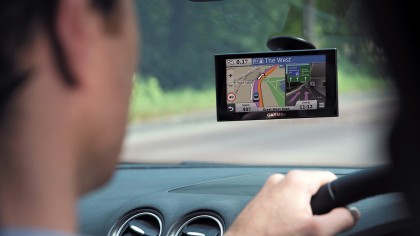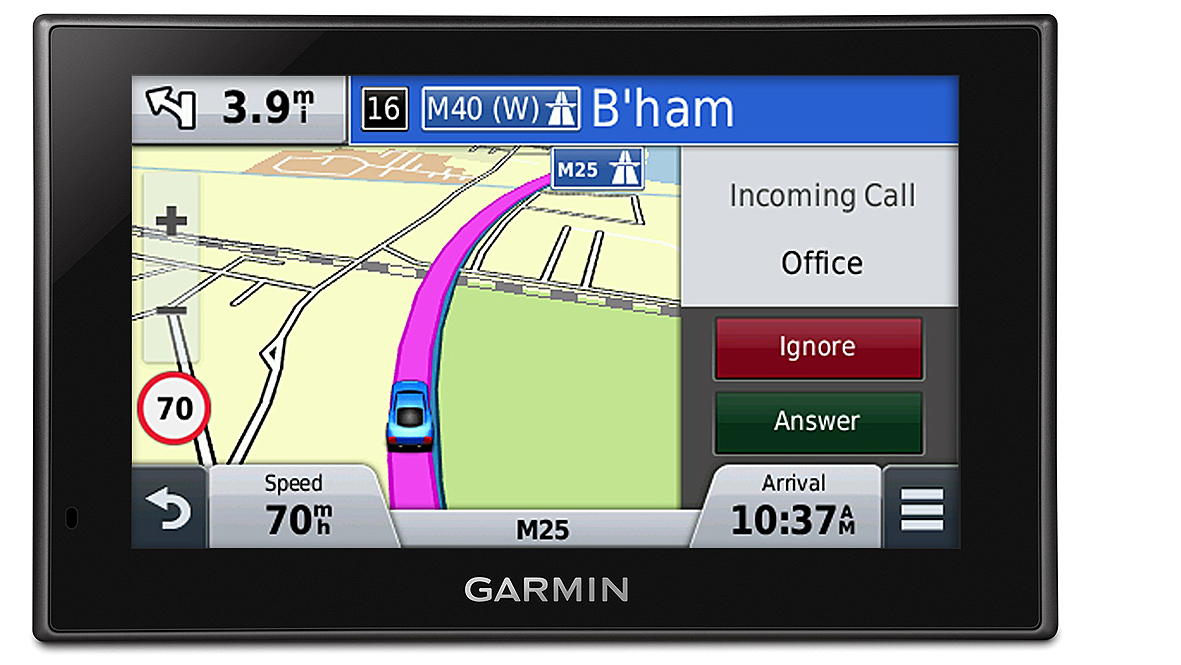TechRadar Verdict
You pay a lot for the Garmin NuviCam LMT-D but your money gets you a state-of-the-art sat nav and a very competent dash cam, which could save money on your insurance, and possibly prevent damage to your car an, indeed, your body.
Pros
- +
Dash cam is a corking addition
- +
Camera allows for extra features like collision warning and lane departure
- +
Makes satnavs feel relevant again
Cons
- -
Glarey screen
- -
We prefer TomTom's maps to Garmin's
- -
Premium price tag
Why you can trust TechRadar
Dash cam sales grew by an astonishing 918% last year and UK insurers are now giving discounts to dash-cam-packing drivers and accepting dash-cam footage in disputed claims. In the anarchic Wild West of Russia's highways, anyone with a sense of mortality and a jot of common sense fits a dash cam to their car, capturing some amazing footage along the way, to show a future police officer, judge or St Peter.
With standalone sat navs under threat from smartphone apps, Garmin's decision to bolt a dash cam onto one of its high quality navigation devices is a no-brainer on two levels, then. Does it justify the £300/$400/AU$630 price? Let's go and find out…
The dash-cam and the sat nav features
The USP here is an 800 x 400 pixel camera on the back. It's set in a swivelling housing, so you can angle it towards the centre of the road ahead from wherever the unit is placed on the windscreen. This is done via a prompted set-up menu whenever you fire the sat nav up, with an FPS-style target to angle the camera just so.
An included 4GB microSD memory card slots into the underside of the unit, capturing around 45 minutes of footage in full HD, 1,080p resolution (you can change this to 720p in the settings, for more saved footage). If you have a card reader, you can pop the card out and download footage at your leisure. Otherwise, you're toting it home.
This is housed in your standard, middle-spec Garmin unit, featuring FourSquare points of interest support, programmable voice recognition, Bluetooth to link to your smartphone and sync Garmin's excellent SmartLink app, which adds limited traffic support, spat out on a responsive, 6-inch touchscreen attached to your windscreen via a classy, magnetised housing.
Dash cam performance and features
First up, this attaches to the windscreen lamprey via a simple and glorious magnet system, popping on and off like an Apple MagSafe charging lead. So there's none of that struggling on and off like you're reattaching a dislocated arm. Wonderful.

Fire the NuviCam up and it's a terrific, responsive, widescreen thing with a sharp, hi-res screen that's only let down by the shiny glass, which excels at collecting glare and reflection at certain angles. But thumb it on and the UI is simple and direct offering a Where To? search or a map view. Voice command pops up immediately, offering the option to holler your postcode/enter a lottery of shouty repetition to find a location.
Simply turning the thing on begins recording, with a discreet red light on the side facing you, telling you it's rolling. By default, the device uses a sensor to detect possible accidental collisions and saves video footage before, during, and after the detected event. You can also manually save a recording by poking the record button on top, which will do same. You can also view and overlay time, date, location, and speed information recorded with the video and it's a simple and intuitive system. Is the thing on? It's recording, pretty much.
Audio recording is an option you can turn on or off, depending on how potty-mouthed your driving is. Mine's pretty sweary, but hey – I am but human.
Adding a camera allows all sorts of value added shenanigans. A FCWS – forward collision warning system – feature alerts you when the device detects you're not maintaining a safe distance between your vehicle and the guy in front. Activating when you pass 30mph, it determines your speed via GPS and calculates a safe following distance based on your speed, firing a noise and warning graphic when you're tailgating like a loon. A lane detection system similarly reads road markings via the camera and scolds you with a noise and a graphic if you're lane surfing like a wonky supermarket trolley.
Sat nav performance
On the GPS side, the Garmin NuviCam LMT-D syncs with Garmin's excellent smartphone app, allowing you to throw addresses to it via your contacts, add traffic updates over 4G, and take and receive calls hands-free. The maps now flash up brand locations as you breeze by, so can you ensure you stop at BP garages, Morrison's supermarkets or worship under the golden arched embrace of McDonald's. The turning instructions, direction graphics and lane change notifications are Garmin's dependable best.
Even the voice recognition isn't as awful as in the past. Mobile phone numbers can now be dialled from the app via voice command and you can set the volume up or down with a few, patient shouts – a menu probably most-thumbed apart from picking destinations. If you want to, you can change the listening command phrase, but we found that less successful. Talk to it like a dog that just pooped on the carpet and you'll make some headway.
A final, sweet flourish throws the camera view to the screen to show that you've arrived at your destination.
We like
First up, the highly competent dash-cam is a great addition that makes hardware sat navs feel relevant again. It could cut your insurance premiums - certain insurers give discounts if you have a dash cam fitted - and it gives handy extra features like collision warning and lane departure.
The sat nav is also very competent, as you'd expect from Garmin
We dislike
Needless to say, premium sat nav + premium dash-cam = premium price. I also happen to prefer TomTom's maps to Garmin's, but you may have a different point of view on that.
Verdict
It really feels this could be the start of something new and yes, we'll go there, exciting – satnavs becoming relevant and necessary again. A better support app that could stream snapshots and review footage would be great, for instance. This shows that sat navs can be more than gobby ordinance survey maps. Add a HUD somehow and this becomes enormously compelling.
That's the future, though. Today, satnavs needs to work harder than smart phones and offer a serious USP to justify their price tag and the NuviCam genuinely does this. The dash cam works really well, and affords Garmin the option to add lane change and impact warnings, something your smartphone is a country mile away from doing.
